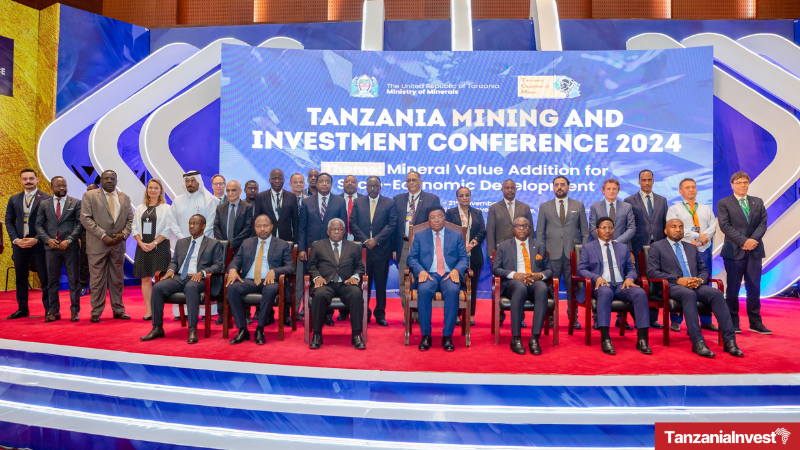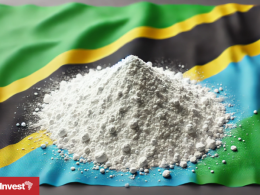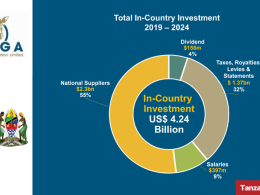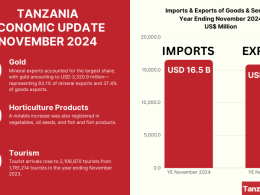Tanzania reaffirmed the government’s pledge to support small-scale miners by providing access to mineral rights, exploration equipment, and additional drill rigs to boost small-scale mining in the country.
This statement was made by Tanzania’s Prime Minister Hon. Kassim Majaliwa at the 6th Tanzania Mining and Investment Conference held from 19th to 21st November 2024 in Dar es Salaam.
The event themed: “Mineral Value Addition for Socio-Economic Development” highlighted the importance of processing minerals to enhance job creation and boost Tanzania’s GDP.
The conference featured networking opportunities, panel discussions, and keynote speeches from industry experts, covering topics such as mining policies and investment incentives.
It aimed to promote local mineral processing, attract foreign investment, and discuss strategies for sustainable growth in the mining sector.
The Conference included panel discussions. The first panel discussions explored how government policies, tax incentives, and regulatory frameworks impact mineral value addition.
Panelists discussed the importance of creating predictable investment environments and addressing barriers to mineral value addition in Africa.
Key recommendations included refining tax regulations, streamlining administrative processes, and strengthening Environmental, Social, and Governance (ESG) compliance to encourage greater private sector participation.
The second panel proposed strategies to overcome barriers in mineral value additionincluding partnerships with technology providers, targeted investments in infrastructure, and stronger collaboration between government and private stakeholders.
The third panel’s discussions centered on the need for tailored training programs, certification standards, and partnerships with universities to address gaps in exploration, processing, and marketing skills.
Panelists also emphasized the importance of aligning education and training with industry needs to foster a skilled and competitive workforce.
Speaking at the event, Hon. Majaliwa highlighted: “We are taking deliberate steps to empower small-scale miners through better access to tools, licenses, and training. These efforts will enable small-scale miners to unlock the potential of their operations, contributing significantly to national economic growth.”
He also emphasized Tanzania’s focus on increasing value addition to its mineral resources, ensuring that more of the country’s minerals are processed domestically to create jobs and boost the economy.
Majaliwa highlighted key government initiatives, including the establishment of mineral trading hubs, improved electricity access, and new transportation links such as roads and ports.
“The government has added 10 drilling rigs to assist miners in exploration efforts. We are also working to extend electricity connections to remote mining areas to reduce operational costs for investors and miners alike,” added Majaliwa.
Majaliwa described Tanzania as a premier destination for mining investment due to its rich mineral resources, favorable policies, and expanding infrastructure.
He reassured investors of Tanzania’s political stability and economic reforms, which have fostered a conducive environment for foreign and domestic investment.
He also invited global companies to explore opportunities in Tanzania’s growing mining sector, particularly in critical minerals like graphite, nickel, and cobalt, which are vital for global green energy transitions.
On his part, Tanzania’s Minister of Minerals, Anthony Mavunde delivered a detailed account of Tanzania’s achievements and plans for its mining industry.
Mavunde highlighted: “From a GDP contribution of 7.2% in 2021, Tanzania’s mining sector now accounts for 9%, and we are on track to reach 10% by 2025.”
He also pointed out that mining exports brought in US$ 3.1 billion in 2023, representing 56% of the country’s foreign currency earnings.
Mavunde mentioned that Tanzania has completed 16% of its high-resolution geological surveys, with plans to reach 50% by 2030, which will aid in the identification of additional mineral resources.
Mavunde added that the procurement of drilling rigs has been a priority, with five rigs already operational and ten more on the way, enabling small-scale miners to identify mineral deposits more efficiently.
Mavunde also highlighted steps taken to improve land access for miners by revoking over 2,600 dormant mining licenses, which will be reallocated to small-scale miners, ensuring more equitable opportunities in the sector.
Mavunde also highlighted new ventures in value addition including building state-of-the-art refineries for nickel and gold for local mineral processing which is vital for creating jobs, increasing tax revenues, and reducing reliance on exports of raw materials.
On his part, the Vice President of FEMATA, Victor Tesha echoed the Prime Minister’s sentiments, urging for more drilling rigs and licenses for small-scale miners.
Tesha expressed confidence that government support would help small-scale miners achieve their goal of contributing 60-70% to Tanzania’s mineral production by 2030.
Representatives from Geita Gold Mine and Barrick Gold reaffirmed their commitment to local employment, sustainability, and value addition.










